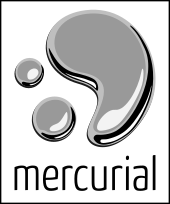Mercurial
 |
|
| Developer(s) | Matt Mackall |
|---|---|
| Initial release | 19 April 2005 |
| Stable release |
4.1.3 / 18 April 2017
|
| Preview release |
4.2-rc / 18 April 2017
|
| Repository | www |
| Written in | Python and C |
| Operating system | Unix-like, Windows, Mac OS X |
| Type | Revision control |
| License | GNU GPL v2+ |
| Website | www |
Mercurial, a cross-platform, distributed revision-control tool for software developers, is mainly implemented using the Python programming language, but includes a binary diff implementation written in C. It is supported on Windows and Unix-like systems, such as FreeBSD, Mac OS X and Linux. Mercurial is primarily a command-line driven program, but graphical user interface extensions are available. All of Mercurial's operations are invoked as arguments to its driver program hg (a reference to Hg - the chemical symbol of the element mercury).
Mercurial's major design goals include high performance and scalability, decentralized, fully distributed collaborative development, robust handling of both plain text and binary files, and advanced branching and merging capabilities, while remaining conceptually simple. It includes an integrated web-interface. Mercurial has also taken steps to ease the transition for users of other version control systems, particularly Subversion.
Matt Mackall originated Mercurial and serves as its lead developer. Mercurial is released as free software under the terms of the GNU GPL v2 (or any later version).
Mackall first announced Mercurial on 19 April 2005. The impetus for this was the announcement earlier that month by Bitmover that they were withdrawing the free version of BitKeeper.
...
Wikipedia
